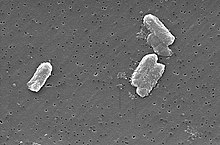Economic geology: Difference between revisions
Geologist258 (talk | contribs) No edit summary |
The criticism section while properly referenced is not relevant to the description and is unnecessarily political, offensive and defamatory. It should not be allowed. Tags: section blanking gettingstarted edit |
||
| Line 30: | Line 30: | ||
The study of [[sedimentology]] is of prime importance to the delineation of economic reserves of [[petroleum]] and [[coal]] energy resources. |
The study of [[sedimentology]] is of prime importance to the delineation of economic reserves of [[petroleum]] and [[coal]] energy resources. |
||
== Criticism == |
|||
In a 2007 [[climate change]] survey<ref>''Examining the Scientific Consensus on Climate Change,'' by Dr. Peter T. Doran and Maggie Kendall, Eos Journal, Volume 90, Number 3, American GeoPhysics Union, 1/20/2009 [http://www.agu.org/pubs/eos-news/]</ref> published in the [[American Geophysical Union]]'s international journal, ''[[Eos (journal)|Eos]]'', Earth scientists were asked whether global temperatures had risen since 1800 and if so, whether this was due to human influence. Overall, 90 percent of respondents agreed that temperatures have risen. Regarding causes, though 82 percent indicated that human activity was a 'significant contributing factor in changing mean global temperatures," less than half of economic geologists agreed. |
|||
Given that economic geoscientists had the lowest percentage of all Earth scientists surveyed, critic and author John Cook has claimed that "[[climate scepticism]] seems strongest among geologists closely linked to the mining and fossil fuel industries" and that this is due to the influence of their funding.<ref>''Geologists and climate change denial,'' by John Cook. Australian Broadcasting Corporation. ABC Environment. June 8, 2011. [http://www.abc.net.au/environment/articles/2011/06/08/3226946.htm]</ref> In suggesting a rationale for [[climate change denial]], Cook noted a maxim by [[Upton Sinclair]]: "It is difficult to get a man to understand something, when his salary depends upon his not understanding it." |
|||
The 2007 study's senior investigator, Dr. [[Peter Doran]], has noted as it relates to the findings that 'the [[American Association of Petroleum Geologists]] has a public position statement formally rejecting the likelihood of human influence on recent climate.'<ref>''Eos Survey FAQs, University of Illinois at Chicago.''[http://tigger.uic.edu/~pdoran/survey_faq.html]</ref> |
|||
==References== |
==References== |
||
Revision as of 09:23, 6 May 2014

Economic geology is concerned with earth materials that can be used for economic and/or industrial purposes. These materials include precious and base metals, nonmetallic minerals, construction-grade stone, petroleum minerals, coal, and water. The term commonly refers to metallic mineral deposits and mineral resources. The techniques employed by other earth science disciplines (such as geochemistry, mineralogy, geophysics, petrology and structural geology) might all be used to understand, describe, and exploit an ore deposit.
Economic geology is studied and practiced by geologists. However it is of prime interest to investment bankers, stock analysts and other professions such as engineers, environmental scientists, and conservationists because of the far-reaching impact that extractive industries have on society, the economy, and the environment.
Mineral resources
Mineral resources are concentrations of minerals significant for current and future societal needs. Ore is classified as mineralization economically and technically feasible for extraction. Not all mineralization meets these criteria for various reasons. The specific categories of mineralization in an economic sense are:
- Mineral occurrences or prospects of geological interest but not necessarily economic interest
- Mineral resources include those potentially economically and technically feasible and those that are not
- Ore reserves, which must be economically and technically feasible to extract
Ore geology

Geologists are involved in the study of ore deposits, which includes the study of ore genesis and the processes within the Earth's crust that form and concentrate ore minerals into economically viable quantities.
Study of metallic ore deposits involves the use of structural geology, geochemistry, the study of metamorphism and its processes, as well as understanding metasomatism and other processes related to ore genesis.
Ore deposits are delineated by mineral exploration, which uses geochemical prospecting, drilling and resource estimation via geostatistics to quantify economic ore bodies. The ultimate aim of this process is mining.
Coal and petroleum geology

- See main articles Coal and Petroleum geology
The study of sedimentology is of prime importance to the delineation of economic reserves of petroleum and coal energy resources.
References
- U.S. Geological Survey Circular 831, Principles of a Resource/Reserve Classification for Minerals (PDF format)
- Dill, H.G., 2010. The “chessboard” classification scheme of mineral deposits: Mineralogy and geology from aluminum to zirconium. Earth-Science Reviews Volume 100, pp.1-420, 2010
